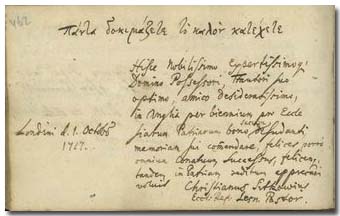

Hisce Nobilissimo Expertissimoque Domino Possessori, Fautori suo
optimo, amico desideratissimo, in Anglia per biennium pro
Ecclesiarum Patriarum, bono secum desudanti, memoriam sui
commendare, felices porrò omnium conatuum, successus, felicemque
tandem in Patriam reditum apprecari voluit
Christianus Sitkowius
Eccl[esiae] Ref[ormatae] Lesn[ae] Pastor.
Londini d. 1. Octobr. 1717.
|
* 1Thess 5:21: in the Vulgate: “omnia autem probate
quod bonum est tenete”. Also quoted by Campegius Vitringa, Jr.
on p. 125.
|
|
|
Prove all things, hold fast that which is good. *
With this I recommend myself into the memory of
the noble and experienced owner [of this album], my eminent
supporter and desired friend, with whom we devoted our efforts
together in England to the good of our churches at home; and at
the same time I wish him good success in all his aspirations, and
finally fortunate return in his fatherland
Christianus Sitkowius
pastor of the Reformed church in Lesna
In London, on October 1, 1717.
|
p.
462. London, October 1, 1717
Sitkowski, Krystian
(active between 1706-1735), Polish
Reformed pastor
Krystian Sitkowski (Sitkowius) was a member of the Protestant
community in Poland. In 1706 he studied in Frankfurt an der Oder,
and in 1707-1708 in the Netherlands. He became pastor of the
Reformed church of Leszno (Lissa). This town accepted several
waves of Protestant refugees from the 16th century on, the Czech
Brothers had both a church and a school here. In the latter taught
from 1628 Jan Amos Komenský (Comenius), and here was rector and
town pastor the grandson of Comenius Daniel Ernst Jablonski, the
later court preacher of the Prussian king in Berlin. Lissa burnt
down in the Northern War in 1707, and at this time Jablonski made
much effort for the rebuilding of the school and the church.
Sitkowsi and his companion Samuel Andersch were advised and
supported by Jablonski to travel to the Netherlands and to England
between 1715 and 1717 for collecting donations. On November 22,
1734 Sitkowski was elected superior of the Czech Brothers in
Poland, and in 1735 he participated at the consacration of the
Bishop of the community of Herrnhut. He died in Geneva. A part of
his heredity, thus his documents referring to his fundraising
tour, are preserved today in the Unitätsarchiv der Evangelischen
Brüder-Unität in Herrnhut. He wrote a number of ecclesiastical
works, thus among others the history of the Reformed communities
and schools of the Polish Kingdom and the Lithuanian Grand Duchy: Notitia ecclesiarum
ac scholarum evangelico reformatorum per Regnum Poloniae et M.
Ducatum Lithuaniae dispersarum. In: Tempe Helvetica:
Dissertationes atque observationes theologicas, philologicas …
Zürich, 1735-1742/43. Index in 6. 1742/43.
From a letter written by Pápai Páriz to Count Sándor Teleki on
December 25 (14), 1715 we know that the Polish had arrived six
weeks earlier to England with letters of recommendation from the
Prussian king. This royal support was most probably secured by
Jablonski. Although Pápai Páriz notes that they feared the new
fundraising competitors, nevertheless Sitkowski calls him his
"supporter" (fautori suo optimo) in his note written in the Album
on October 1, 1717. Both the date of the earlier letter, and the
text of the present note confirms that for two years they had been
making common efforts in the interest of the support of their
respective churches (per biennium pro ecclesiarum patriarum bono
secum desudanti). Samuel Andersch, companion of Sitkowski had
written in the album in May of 1716 in London, while Jablonski at
the beginning of the peregrination of Pápai Páriz, in November of
1711 in Berlin (pp. 463,
121).
•
Jankovics 143, 150 • Orgelbrand XIII 150 • PAB 507: 055 •
Peregrinus 64 |

